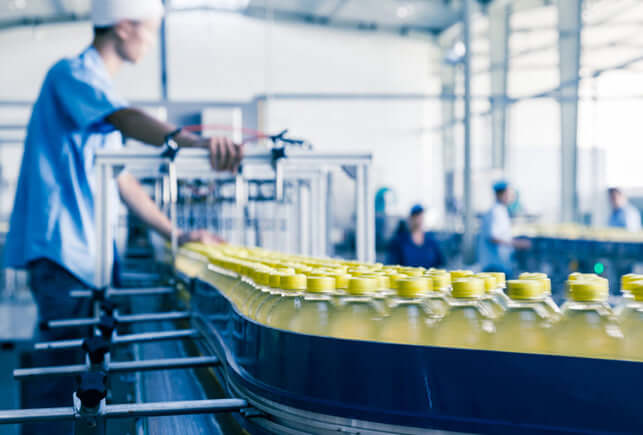Your Cart is Empty

Compressed Air in the Food & Beverage Industry
Compressed air is used in processes throughout the food & beverage industry. From operating cutting machines in food manufacturing to capping bottles in breweries, compressed air keeps these operations running at peak efficiency.
Applications of Compressed Air
- Air knives use compressed air to cut, peel, and blow off products in the production process
- Fluid pumps use compressed air to move liquid products in the production and packaging process
- Food filling machines use compressed air to fill containers with product during the packaging process
- Process vacuums use compressed air to generate vacuum used during the packaging process
- Compressed air is used to move products as they travel through the production process
Dealing with Seasonality
Although not every business in the food & beverage industry is prone to seasonality, many are. It can be seasonality of demand for the product or, more often, seasonality of supply. With companies that deal with large swings in compressed air capacity requirements, they often choose to rent equipment to meet their demand. A great example of this is how grape harvest season takes place in late Summer through early Fall, so many vineyards choose to rent compressors to meet that year’s capacity needs.
Setting Air Quality Standards
With compressed air being applied throughout the food & beverage industry, companies are requiring clean, dry air. They can’t risk product or process contamination because it could end in illness of customers, spoilage of products, and product recalls, thus compressed air standards for the food industry are imperative. Although the FDA has taken a proactive approach and wants to catch problems before they occur, there are not specific laws about compressed air quality standards.
The responsibility for risk assessment and determining acceptable levels of contamination has been put onto businesses. When making an action plan, company leadership should use the following HACCP (Hazard Analysis and Critical Control Point) principles
- Conduct a hazard analysis
- Determine the critical control points (CCPs)
- Establish critical limits
- Establish monitoring procedures
- Establish corrective actions
- Establish verification procedures
- Establish record-keeping and documentation procedures
Why People Choose Oil-free Compressors
Many companies have decided to take out the risk of compressor lubricant contaminating the product or process by going oil-free. Oil-free compressors don’t put lubricant into the air system in the first place, which allows them to deliver ISO 8573-1 Class 0, oil-free air. Although this level of air quality is not currently required by food safety codes, it is the way the industry is going because it allows for peace of mind that everything possible has been done to limit risks.
Work with a Rogers Machinery expert to address your compressed air needs.
View compressed air solutions for the food & beverage and packaging industries.





